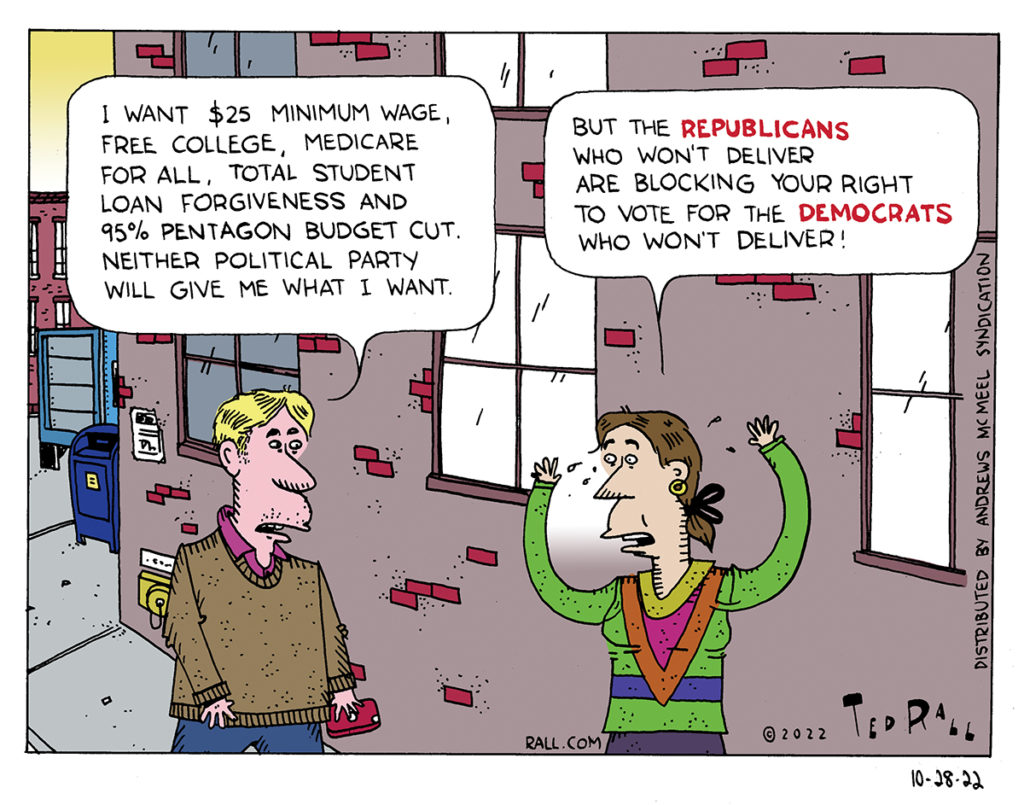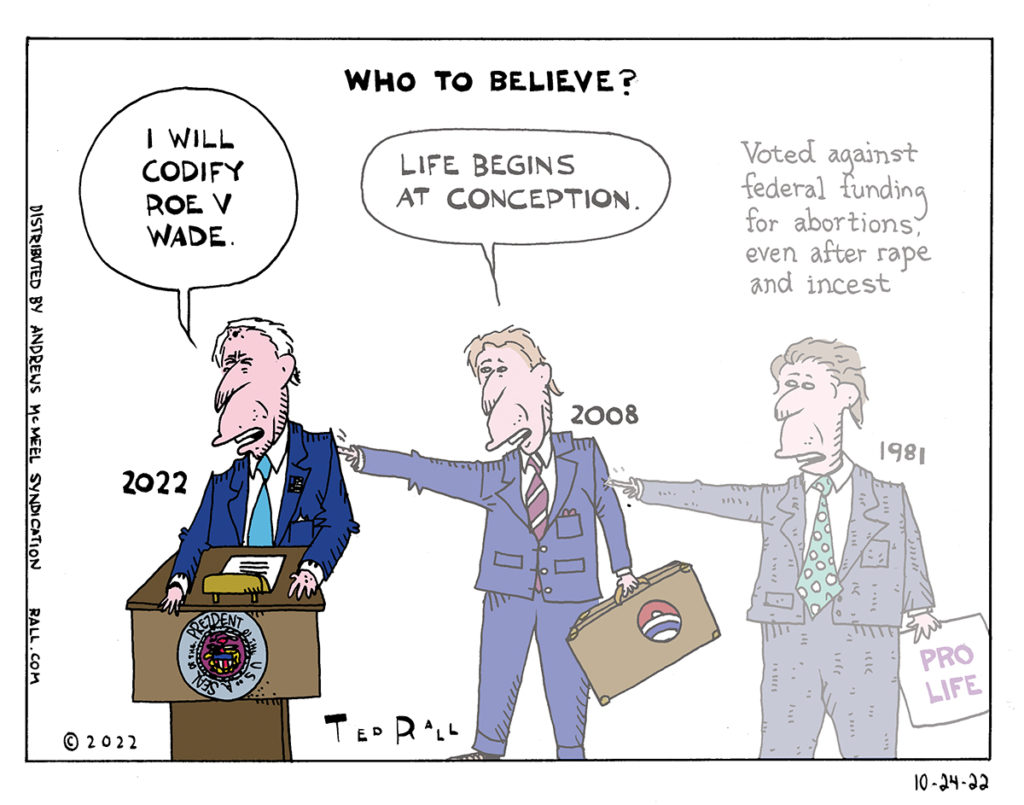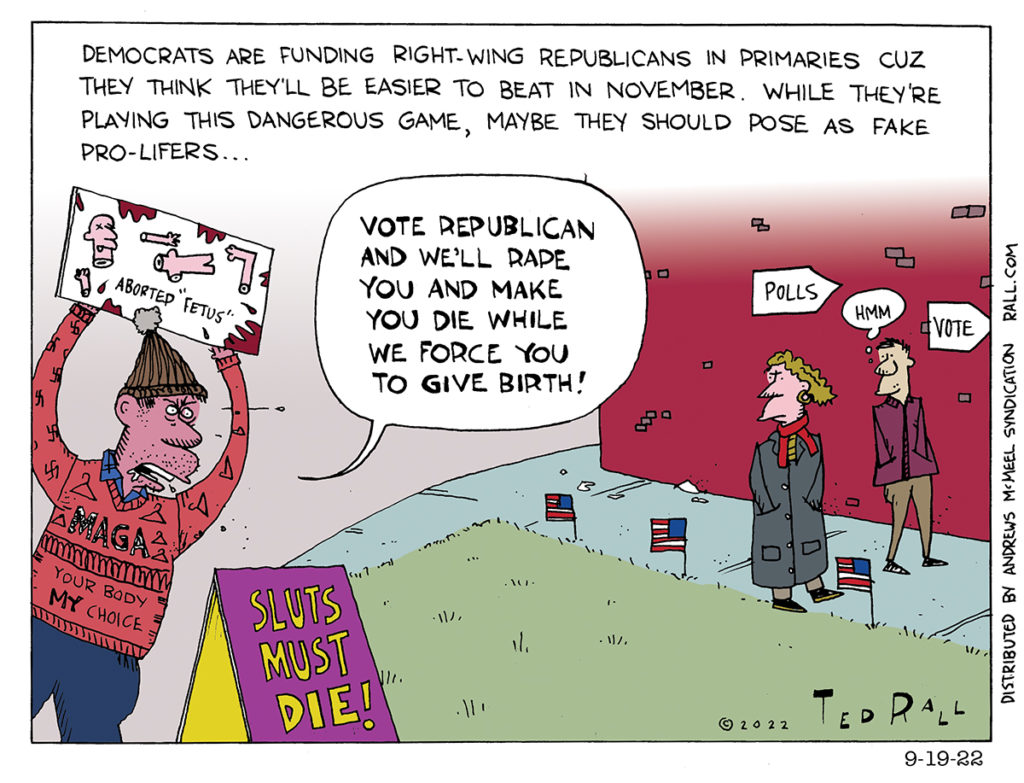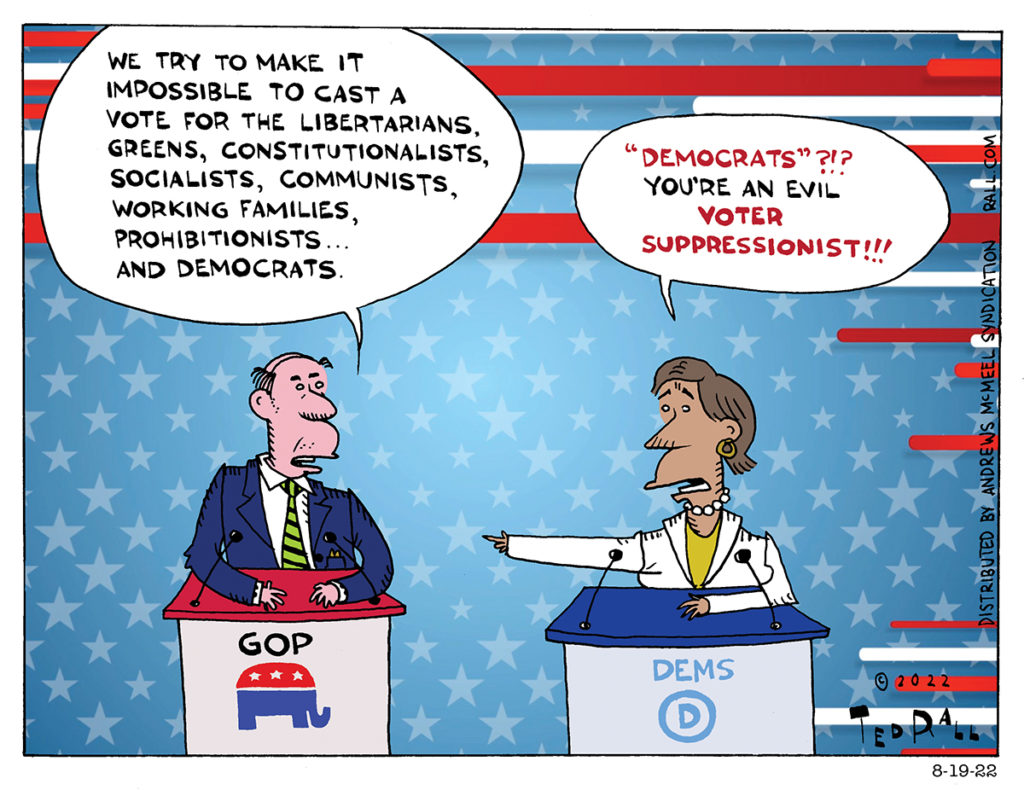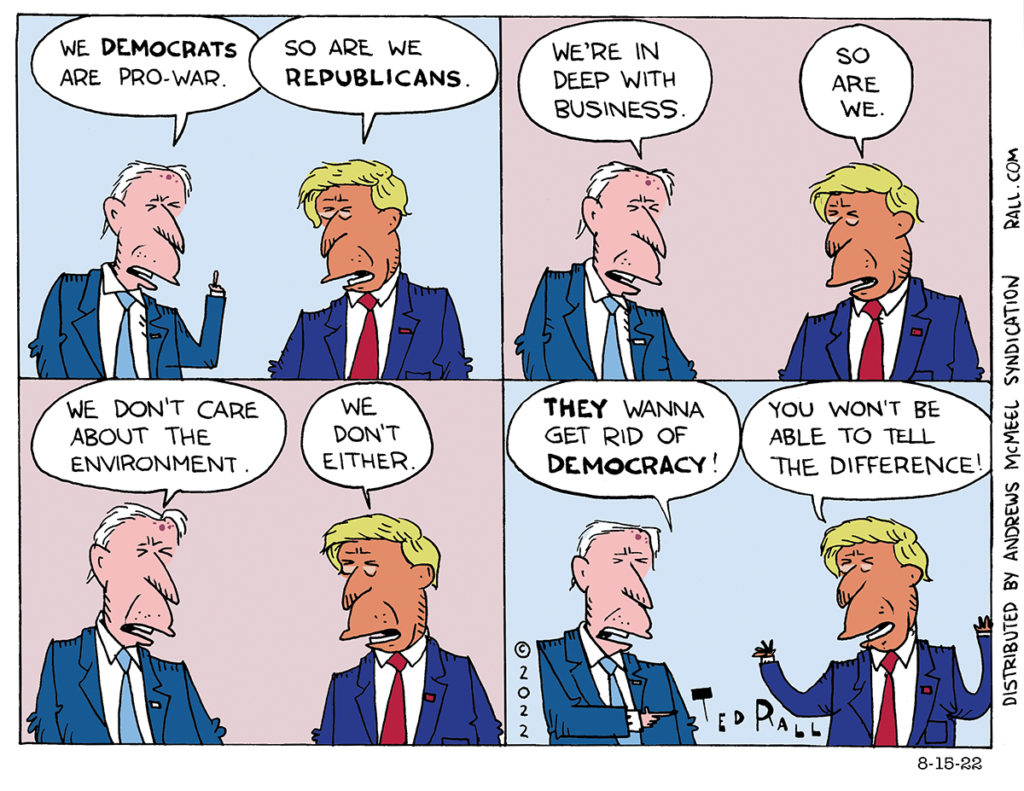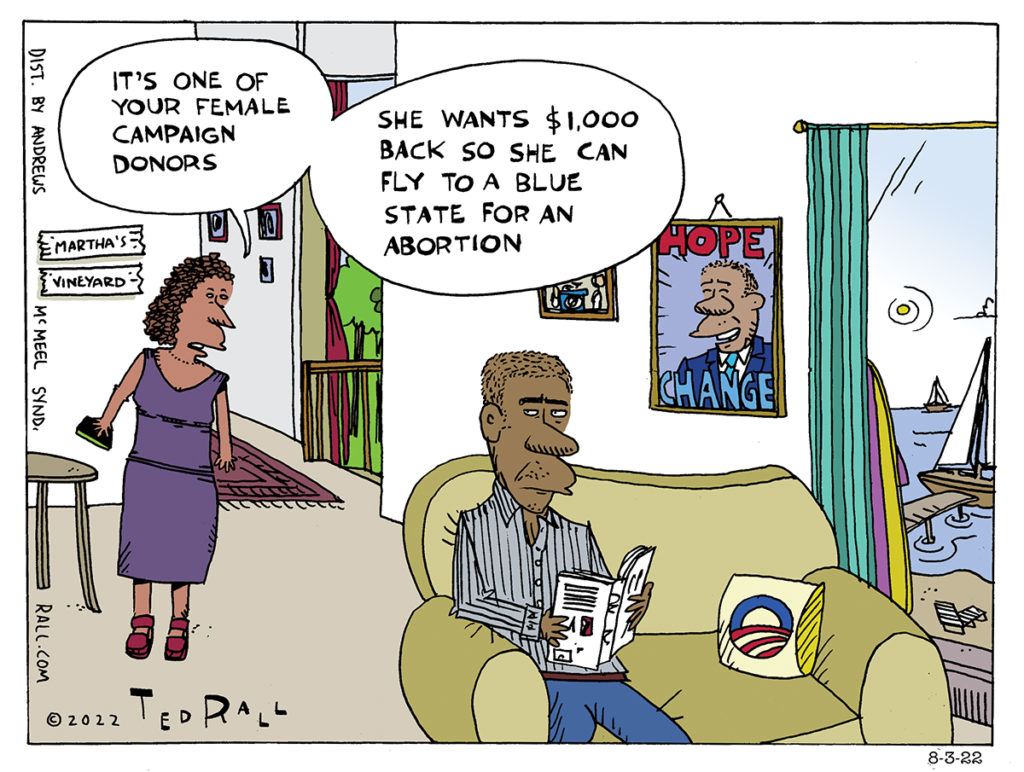Much of the Democratic campaign for the 2022 midterm elections centers around efforts by Republicans to suppress Democratic votes. If you love what the Democratic Party stands for, it’s an outrage. Not so much if you don’t.
DMZ America Podcast 72: The Midterms are Looming, What Will the Republicans Do If (or When) They Take the House? And What Does Haiti Have To Do with Ukraine?
In this edition of the DMZ America Podcast, nationally-recognized Editorial Cartoonists Ted Rall and Scott Stantis discuss the quickly-approaching midterm elections. How the Democrats are blowing it and why it will be partly their fault if a bunch of MAGA nutbags get elected. Also: what does Haiti have to do with Ukraine?
Lies Begin at Political Conception
Which Joe Biden should voters believe? The one who, for many years, was a pro-lifer who was so extreme that he voted against federal funding for abortions even in the case of rape, incest and the life of the mother? Or the current one who says he would codify Roe v. Wade if he got the chance — which, of course, Obama chose not to do while Biden was vice president.
The Two-Party System is Under Attack, Stupidly
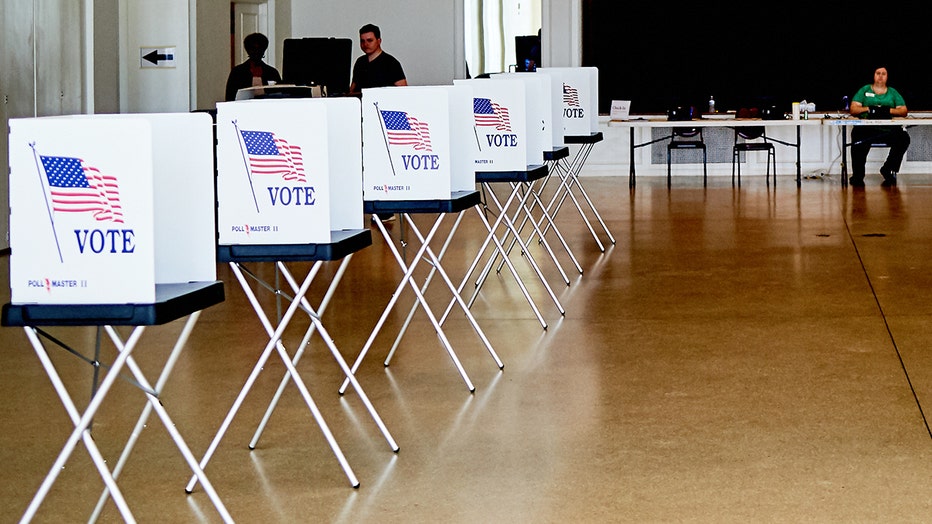
At least at first, America’s founders famously disliked political parties, and so failed to provide for them in the Constitution. Like them or not, however, the two-party system has prevailed for 95% of our history. Given that third parties face high barriers to obtain ballot access, are shut out of televised debates and routinely denied media exposure, the duopoly is likely to be with us for the foreseeable future.
A corollary to Toqueville’s observation that a well-informed electorate is essential to democracy is that fuzziness and confusion at the ballot box means that voters cannot make an informed decision, will feel cheated and fooled, and will eventually lose faith in electoral politics altogether.
Alas, our two-party system is being corrupted by forces and reforms that trick and manipulate voters.
I’m not talking merely about the longstanding phenomenon of the conservative DINO Democrat or the liberal RINO Republican, though gray-zone wishy-washies do muddy the waters. What used to be a relatively simple choice between the party of liberalism and the common man versus the party of tradition and business is under heavy fire.
This year, for example, Democrats spent $53 million on ads across nine states on “six gubernatorial races, two Senate contests, and five House campaigns,” according to The Washington Post, in order to help far-right MAGA candidates and smear their moderate Republican opponents in GOP primaries—in the words of The New York Post editorial board, “putting their money where Donald Trump’s mouth is” on a bet that Trump-aligned Republicans will be easier to beat this November. Democratic interference worked in four of those.
Both parties have done this sort of thing before, but on nothing close to this scale.
Setting aside the hypocrisy of Democrats characterizing extremist Republicans as an existential threat to democracy and financing those nutty right-wingers so they advance closer to elected office, funneling funds across party lines is a fraud against voters of both parties. Democratic donors don’t send checks to the Democratic Party in order to support the Republican Party. If Dems asked their supporters for permission to divert their donations to their supposed political enemies, that would be something else—but there’s no evidence of that.
At the same time, the money sidelined for this mother of all Democratic dirty tricks covert operation might otherwise have been directed to cash-poor Democratic candidates who could have used it to prevail in the general election. The whole party is thus arguably a fraud.
If Republican primaries aren’t a forum for debate and discussion between and for Republicans only, what’s the meaning of a Republican nominee? Perhaps in an open- primary state they should be listed on general-election ballots as “Mostly Republican” or “Somewhat Republican,” since it’s theoretically possible for more than half the voters in a primary race to be Democrats.
More fundamentally to democracy, people who vote in these races are unaware of some major facts. If Democratic voters knew that their own party helped the “extreme right” Republican nominee, they might withhold their vote from both candidates in order to protest this practice. On the other hand, Republican voters might not reflexively support “their” party’s nominee if they thought they were being duped. Or they might be more likely to do so in order to teach Democrats a lesson. D vs. R isn’t the same as D vs. R*, though they’re labeled the same.
Federal campaign finance laws ought to be clarified in order to prohibit the redirection of monies raised to support the candidates of one party to those of another party.
Washington, California, Nebraska and Alaska have abolished party primaries in favor of blended primaries in which the top-two vote-getters compete in the general election. The law of unintended consequences is epitomized by this misbegotten attempt to reduce polarized outcomes, which has not worked. California’s top-two system was supposed to increase voter participation; instead Republican voters often stay home in the many districts where the general election is a face-off between a progressive Democrat and a moderate Democrat. Democrats often recruit insincere Republicans to dilute the Republican field enough to push their name into the top two. “Now you have someone in every little f—ing Assembly race trying to prop up the Republican,” Paul Mitchell with Political Data Inc. told CalMatters. “It’s become a part of the process as much as lawn signs. It’s part of the California campaign war chest.”
In the recent Alaska contest for Congress lost by former governor Sarah Palin, 60% of voters wanted a Republican. Yet a Democrat won.
Blended primaries have disenfranchised California Republicans and made it impossible for the average voter to understand who is paying for whom and why. Furtive motivations behind candidacies are anathema to a vibrant democracy that are supposed to be battles of ideas.
Whatever their flaws, political parties provide concise branding for voters who prefer to spend their time doing something other than studying the 50-page ranked-voting guide sent to New York City voters in the last mayoral race. As a political cartoonist and writer, I am as well informed as any citizen can reasonably be expected to be, yet it isn’t realistic to expect me or anyone else to know about the personal and political history of every minor candidate. Like many voters, I’ve never heard of most of the hopefuls for city council or judges so I vote straight party line on the (hopefully not too incorrect) assumption that party affiliation relates to ideological bent. Nonpartisan primary systems require an excessive level of engagement and should be abolished.
Similarly, open primaries in which people registered to one party may vote in the rival party’s primaries undermine the most appealing aspect of a two-party system, the ability of liberals to choose a liberal standardbearer without conservative influence and vice versa. Half the states have full, or partial open presidential primaries in which independent nonaffiliated voters may participate in a partisan primary.
Especially in races where one party’s nominee runs unopposed, as did Barack Obama for the Democratic nomination in 2012, it is tempting for that party’s partisans to vote in the rival party’s open primaries for the express purpose of causing mischief. 7% of votes cast in Georgia’s recent “Republican” primaries were Democrats. Brian Kemp trounced David Perdue, the weaker candidate for whom the crossover Democrats most likely voted. But it isn’t hard to find other examples where 7% would change the outcome.
I would have found it fun and hilarious, if I lived in Georgia, to vote in the Republican primary to mess with the results. As a leftist who believes systems ought to work fairly and intelligently, my right to a good time shouldn’t trump democracy.
I would prefer a parliamentary system. Nations with set or de facto two-party systems like the United States (56% in 2016), the United Kingdom (62%), Canada (62%) and Japan (53%) have significantly lower voter participation rates than those with multi-party democracies like Turkey (89%), Sweden (82%) and Israel (78%). The cause is self-evident. Voters are more motivated to turn up at the polls when their preferred party might win a seat at the table; a minor party may join a coalition government under a parliamentary system.
But let’s stick to reality. Until we free ourselves of the Democratic-Republican stranglehold, we’re stuck with the two-party system. And that system ought to be as easy to navigate as a supermarket shelf. Whether it’s a can of food or a political candidate, what is on the label of a product ought to be contained inside.
(Ted Rall (Twitter: @tedrall), the political cartoonist, columnist and graphic novelist, co-hosts the left-vs-right DMZ America podcast with fellow cartoonist Scott Stantis. You can support Ted’s hard-hitting political cartoons and columns and see his work first by sponsoring his work on Patreon.)
Very Risky Business
Democrats are currently engaged in a very risky strategy: they are financing right wing pro Trump Republicans in Republican primaries and runoff elections based on the assumption that they will be easier to defeat in the fall. While they are at it, perhaps they should use similar tactics on abortion…
Trump’s Critics Are Even More Dangerous Than He Is

Edward Luce of the Financial Times recently tweeted one of the most overheated sentences ever uttered in the world of politics: “I’ve covered extremism and violent ideologies around the world over my career. Have never come across a political force more nihilistic, dangerous & contemptible than today’s Republicans. Nothing close.” General Michael Hayden, former director of the CIA and NSA, added: “I agree.” These opinions, and the fact that they are quoted approvingly by Margaret Sullivan in her final column as a media writer for The Washington Post, indicate that Trump Derangement Syndrome is raging at a 106° fever pitch among Democratic elites.
Luce’s remark is pure madness. No one will out-disdain me when it comes to the GOP but only a lunatic would argue they’re more “nihilistic, dangerous and contemptible” than the Khmer Rouge, the Rwandan Hutu-led government of Théoneste Bagosora, Al Qaeda, ISIS or Saudi Arabia. It’s depressingly revealing to watch that someone who so clearly ought to and probably does know better like Sullivan, who earned praise for her courageous run as ombudsman at The New York Times, regurgitate such ahistorical nonsense and turn to a man like Hayden—who for years presided over the exquisitely illegal effort to collect and store every communication between every individual and organization on Earth—for his opinions on democracy.
(Disclosure: After some initially-promising email exchanges about the possibility that she and the Post might look into the Los Angeles Times’ decision to fire and smear me as a favor to the LAPD, Sullivan ghosted me.)
There is nothing wrong with sounding the alarm about Donald Trump. But democratic institutions face a far bigger threat than the former and possibly future president: the argument, repeated incessantly across multiple platforms by boldfaced media and political personalities, that Trump is especially dangerous, that he lied/lies more than other politicians, that his politics are exceptionally extreme…that he is somehow unique.
The standard argument that, as Post columnist Jennifer Rubin put it in her 2017 screed, that “[Trump] is Not a Normal President,” invites the American public to buy into three assumptions:
- Other presidents and politicians tell fewer lies—a lot fewer—than Trump.
- Nothing was fundamentally wrong with the United States or its political system before Trump came along.
- Get rid of Trump and everything will be fine.
Certainly, Trump and his presidency were unusual in some respects. He’s the only man to have won the White House without having held political office or served in the military. He eschewed prepared speeches. His campaign ran on a shoestring budget without a national organization. He expressed the willingness to talk to enemies and adversaries without preconditions. He continued to hold campaign rallies during his presidency. But the media hype is a lie. In the ways that matter most in a presidency—policy and tone—Donald Trump was/is anything but anomalous.
Yes, Trump refused to concede the 2020 election. George W. Bush refused to concede the 2000 election.
Trump’s goons resorted to violence to try to overturn an election. So did Bush’s.
Trump tried to steal an election. Bush succeeded.
Trump wallowed in racist dog whistles. So did Ronald Reagan and George H.W. Bush.
Trump’s cabinet was full of underqualified nuts. So was Reagan’s and Bush’s.
The first step is admitting that you have a problem. American democracy has big problems. But neither the media nor the political class nor the voters are willing to acknowledge them—so there’s no chance we’ll fix them.
Not only are we in denial about the systematic flaws baked into our political system—two parties that conspire to keep smaller parties off the ballot, the inherently corrupting influence of capitalism on democracy, the electoral college and the revolving door between business, media and politics—we’re deluding ourselves into believing that Donald Trump is the problem.
Trump isn’t the problem. He’s a symptom.
The duopoly gave us Trump when the DNC kneecapped his strongest Democratic primary challenger, Bernie Sanders, in favor of Hillary Clinton. The cult of money convinced voters that his wealth qualified him for office. The electoral college gave him the White House even though he got fewer votes.
Those who obsess over Trump are far more dangerous than he is. Trump is old and fat and, before long, will no longer be with us. The issues we’re ignoring while we’re distracted by Trump will afflict us for years to come.
As will the idiots who won’t shut up about Trump.
(Ted Rall (Twitter: @tedrall), the political cartoonist, columnist and graphic novelist, co-hosts the left-vs-right DMZ America podcast with fellow cartoonist Scott Stantis. You can support Ted’s hard-hitting political cartoons and columns and see his work first by sponsoring his work on Patreon.
Voter Suppression? You’re Soaking in It
Democrats rightly criticize Republicans for efforts to suppress the Democratic vote. But both parties suppress third parties like the Greens and Libertarians. If you doubt that, look for the third parties next time you cast a ballot. Any country with just two parties can’t reasonably call itself a democracy.
Who Can Tell the Difference?
Democrats complain, correctly, that Republicans are trying to subvert democracy with voter suppression and other tactics. But what democracy are they trying to subvert? Both parties are far more similar than anyone would like to admit, meaning that there isn’t really a true choice at the ballot box in the first place.
I’m Going to Need a Little Bit of That Money Back
Republicans oppose abortion rights in Congress, but Democrats have the chance to codify abortion into federal law when Obama had a 60-vote supermajority in the US Senate. He chose not to do so, saying that it was a low priority. He also made it a low priority to push through his supreme court pick, Merrick Garland, because he assumed that Hillary Clinton would beat Trump.

